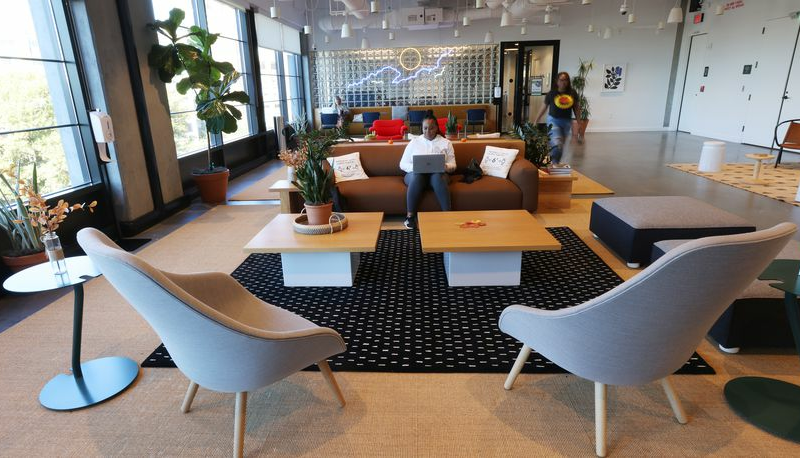By Andy Peters, The Atlanta Journal-Constitution
Troy Warren for CNT #Business
But uncertainty remains, with omicron posing latest hurdle
Quinton Myers expects his payments company, Appetize, to double its Atlanta-based staff from 14 to 28 in the next few months to handle a surge in business.
To make room for his future colleagues, but also stay flexible, the company avoided a traditional multiyear lease. Instead, it opted to rent a larger space at the Colony Square location of WeWork, a coworking office.
“We can always upgrade and alter our space whenever we need it,” said Myers, Appetize’s director of client services.
In a coworking office, businesses or people can rent anything from a desk to offices and meeting spaces for a day or as long as needed. Some offices also offer amenities such as coffeeshops and on-site tech help.
Coworking companies hope to find more clients like Myers as the Atlanta office market seeks a new balance after COVID-19 changed workers’ and companies’ expectations about office life and remote work.
In the decade before the pandemic, coworking became popular among startup tech companies and workers without a home office, such as sales people. But when the pandemic forced everyone to isolate at home, the coworking sector lost many clients, closing millions of square feet nationally of unused space. New York-based coworking rental company Knotel filed for bankruptcy in January.
What happens next is unclear, with many people still working remotely. Many employers had planned to bring more workers back to offices around Labor Day, before the delta variant of COVID-19 put many plans on hold. The rise of the latest variant, omicron, could mean further return-to-office delays.
Still, the growing economy has coworking companies hoping for a rebound. They believe they give employers and workers needed flexibility as future office needs are sorted out and traditional work spaces are reimagined.

Some early signs are not encouraging. Coworking remains a tiny fraction of the total U.S. office market, and it has gotten smaller. Coworking represented about 1.5% of the office market in metro Atlanta as of June 2021, down from 1.8% in June 2020 and 1.9% in June 2019, according to real estate services firm CBRE.
WeWork, one of the largest U.S. coworking companies, recorded a loss of about $3 billion for the first six months of 2021.
But WeWork reported gains in occupancy of the U.S. office space it has retained. It rose from from 50% to 56% in the three months ending in September.
Errol Williams, vice president of WeWork’s Atlantic region, said that in New York City, where it has only 1% of the total office supply, WeWork secured 13% of all new and renewed leases this fall. WeWork operates nine locations in metro Atlanta, but it declined to provide local numbers.
Most coworking providers are privately owned and aren’t required to report occupancy levels or financial results. Commercial real estate services firms like CBRE and JLL don’t track market-wide figures for coworking.
But other factors suggest coworking could carve out a niche, said Julie Whelan, an analyst at CBRE. It can be cheaper than signing a long-term lease.
“Organizations are grappling with a lot of uncertainty on headcount needs,” she said.
The coworking companies are showing some signs of expanding again. Buildings in high-profile locations have successfully lured new coworking tenants. Industrious, one of the largest U.S. coworking providers, in October signed a lease for 20,000 square feet on the 31st floor of the recently renovated downtown 101 Marietta Street tower.
And the service fits a need for certain types of companies. Coworking works well for businesses where staff travel frequently.
Patrick Mundlin, managing partner of the financial planning firm 49 Financial, rents access to all of Roam’s Atlanta locations because his staff is often on the road meeting clients. It wouldn’t make sense to lease a space for 20 people when typically there are only 10 in the office at once.
“When you’re stuck with a long-term lease, you’re paying for something that you’re not using,” he said. “It doesn’t make sense to pay for office space if you won’t be using it.”
In Other NEWS




































